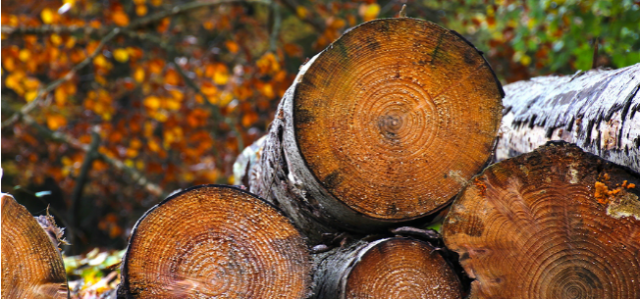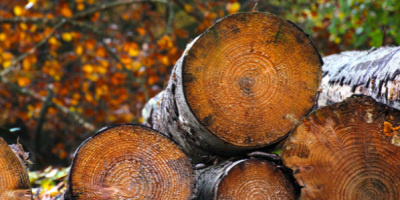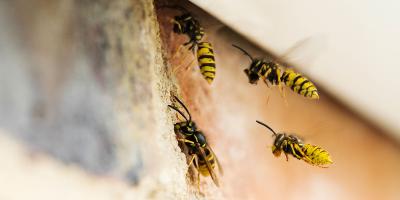5 Simple Ways New Englanders Keep Insects Out Of Firewood

For tried-and-true New Englanders, memories of fall and early winter are often deeply tied to just-starting-to-get-chilly evenings sitting around a nice fire. Whether it’s a sunset around a blazing fire pit or winter nights spent gathered with cocoa around the hearth, fire (and firewood ) have always been there - and so have the bugs it can bring with it.
But wander into many New England homes mid-winter and you may be surprised by how thoroughly bug-free the place may be. That’s no accident - it’s because those in the northeast know to follow a few key bug-control methods when it comes to firewood season that are sure to stop unwanted fall invaders from disturbing your fireplace fun.
1. Harvest Your Firewood When Bugs Are Least Active
The easiest way to make sure your firewood isn’t carrying any insect hideaways is to simply choose wood during the right time of year. Many wood-loving insects are spring- or summer-emergent, meaning they hatch and emerge from under the bark only when the weather is warm. Wood cut and stacked during the spring or summer may look clear at first glance, but in just a few weeks could be teeming with insects just coming to the surface.
Instead, try to limit your log harvest to the late summer or early fall, when insects are more likely to be all gone. One rule of thumb is to wait until october, but your state will likely have guidelines for when is best to harvest local wood. If you must cut wood in the summer, allow it to thoroughly dry, covered, in a warm and sunny place to kill off any insects that might be lying within.
2. Properly Prepare Your Logs
While it may be tempting to get the fire season started as soon as the leaves start to change color, that’s no reason to rush the preparation of your firewood. It’s important to allow your firewood to cure, or lose moisture, which is critical for insect survival. Bring wet logs to your wood pile or fireplace and you may just be transporting the perfect base camp for whatever invaders might lie inside.
Oh, and no matter what kind of insect you might find hanging around your wood pile, NEVER treat your firewood with pesticides or insecticides - because nothing ruins a fire faster than toxic insecticide fumes floating in the smoke.
3. Stack And Store Wood Safely
When it comes to keeping firewood insect-free, the name of the game is staying dry; insects need water, and without it they won’t have much interest in sticking around. But keeping your wood in one large, disordered pile, or directly on the ground, makes staying completely dry just about impossible - and makes for an inviting home for wood-loving bugs.
Rather, by keeping your firewood neatly stacked in ordered columns, off the ground and with plenty of airflow, you make it easy for wood to dry thoroughly and quickly, even after a summer storm. Add a lean-to or even a tarp overhead and you increase your odds of dry firewood even more - keeping insects at arms length straight through until the fire’s blazing.
4. Only Bring In What You Need, When You Need It
As a basic rule of thumb, New Englanders know to only bring inside as much wood as they plan to use that day - just enough to keep the fire burning, and not enough to stick have leftovers when the coals have gone cold. This can drastically decrease the chances for any insect hiding under the bark to make their escape.
5. Don’t Bring Your Firewood For A Drive
Because many of the species that hitch a ride on firewood are those who live within the wood itself, like the emerald ash borer or termites, the introduction of even a small amount of one wood-loving insect can quickly spread to other firewood nearby - or, more devastatingly, to the forests surrounding your wood pile.
With over ⅘ of New England covered in forests, preventing the spread of invasive wood pests is a critically important effort, and the reason that restrictions or outright bans on interstate transportation of firewood are in place in every New England state. To be safe, avoid transporting any firewood more than 50 miles from where it was originally cut - the closer to home, the better.
Enjoy The Fire, Avoid The Invaders
When those chilly nights and early sunsets come around, nothing makes the home seem cozier than toasty toes around a warm fire. But nothing ruins the fun quite like an encounter with insects, and firewood can be an easy ride for plenty of bugs looking to get into your warm house. By following these basic firewood handling tips and working with a pest management professional to keep insects away your home and property, you too can keep those warm memories bug-free well into the winter and beyond.
Be a savvy New Englander: keep bugs out, and keep the fire going all winter long, no insects included.



